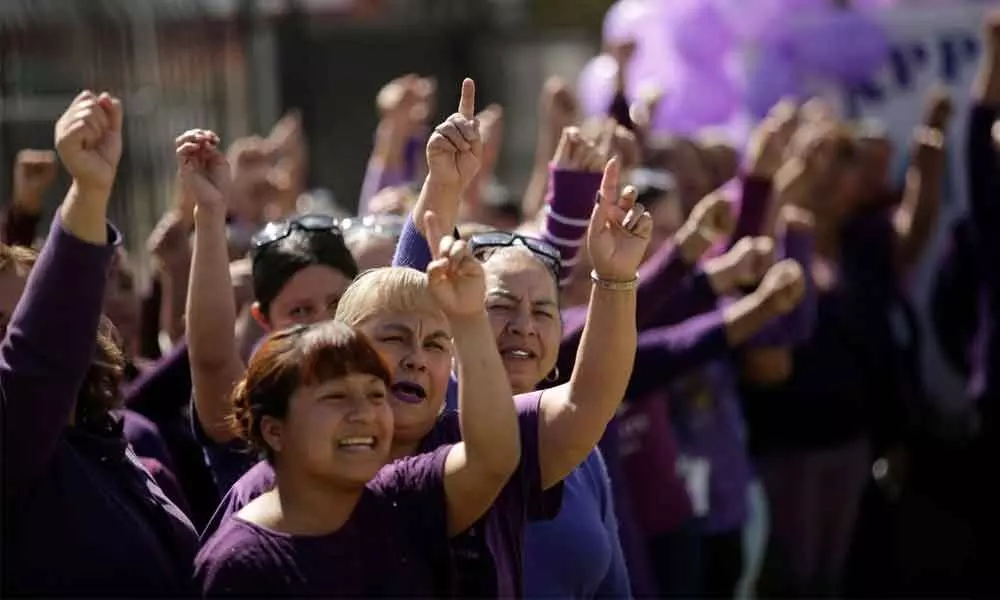Live
- First Impressions and Unboxing of the MacBook Pro M4: A Powerhouse for Professionals and Creators
- China Gears Up for Potential Trade War Amid Trump’s Tariff Threats
- Small Farmers Gain Less by Selling to Supermarkets: Study Reveals
- Why Despite the Controversy, America Is Anticipating the Mike Tyson vs. Jake Paul Fight
- Sanju Samson and Tilak Varma Shine: Record-Breaking Feats in 4th T20I Against South Africa
- India Urges $1.3 Trillion Annual Climate Support for Developing Nations
- Bad air: 106 shuttle buses, 60 extra Metro trips planned to make Delhiites give up cars
- WHO reports declining monkeypox cases in Congo
- CM Attends Kotideepotsavam on Kartika Purnima
- PKL Season 11: Raiding trio of Devank, Ayan, Sandeep help Patna Pirates rout Bengal Warriorz
Just In
A day without women: Strikes in Mexico follow huge rallies


Millions of Mexican women stayed away from offices, schools and government agencies on Monday to join a second day of marches to protest against violence and macho culture, as an eerie quiet fell on normally bustling streets and factories.
Millions of Mexican women stayed away from offices, schools and government agencies on Monday to join a second day of marches to protest against violence and macho culture, as an eerie quiet fell on normally bustling streets and factories.
The wildcat strike, dubbed "a day without us," is intended to show what life would be like if women vanished from society. It followed a series of massive protests on Sunday to mark International Women's Day.
In the northern Mexican city of Ciudad Juarez, on the border with the United States, factories stood unusually quiet as many women stayed home.
"I don't even want to think if this went on for a prolonged period of time," said Luis Carrillo, a manager at NPD Technology, which makes electronic parts for automatic doors in a city famed for its numerous assembly plants.
"There would be huge losses," he said, adding that the company was proud to support its overwhelmingly female workforce and viewed the protests as positive.
Rows of tables and desks were unoccupied on the factory floor.
Mexico's work stoppages drew indigenous Zapatista women in the south and Foreign Ministry employees in the capital into a protest that sought to illustrate what life would be like without them.
A video posted online showed the empty desks of Foreign Ministry workers. Notes posted on chairs bemoaned violence against women.
Last week, leftist President Andres Manuel Lopez Obrador angered many women by suggesting the protest movement had been infiltrated by conservatives and other critics of his government.
Paola Rojas, a female columnist for major daily El Universal, left her space in the newspaper blank expect for a hashtag supporting the protest.
Elsewhere in Latin America, in Chile women wearing medical uniforms, industrial overalls and school uniforms joined a march down a central thoroughfare of Santiago, the capital, to congregate outside President Sebastian Pinera's office.
They banged drums, danced and chanted: "And how, how, how the hell can they torture and rape us and no one does anything?"
Among them was Rosa Ramirez-Rios, an actress in her 70s. Six months ago, she said, many women in the crowd would not have dared to take part.
"I know it's a long process," she said. "We must have patience, persistence, a lot of courage and a lot of desire. The economic and political powers won't give up their privileges easily."
The Mexican capital's usually traffic-choked streets were virtually empty at rush hour. Public transport was mostly empty of women and schools were closed.
Petrol bombs were thrown at the doors of the national palace and women clashed outside the main cathedral with male anti-abortion protesters, some with shaved heads and making Nazi salutes.
Lopez Obrador had said government employees were free to join the walkout.
According to a poll published late last week by newspaper El Financiero, 67% of Mexicans surveyed said they supported the stoppage, while 57% of women said they planned to join.
Some Mexican women turned up for their jobs. Some said they could not afford to miss a day.
The protests are focused on a surge in femicides, or gender-motivated killings of women.
Such killings have risen 137% in the past five years, government statistics show, as gang violence pushed the murder tally to record heights. Most violent crime in Mexico goes unsolved.
Organisers of Sunday's march in Santiago estimated two million people took part, compared with a police estimate of 150,000. There were sporadic clashes between marchers and police.

© 2024 Hyderabad Media House Limited/The Hans India. All rights reserved. Powered by hocalwire.com






